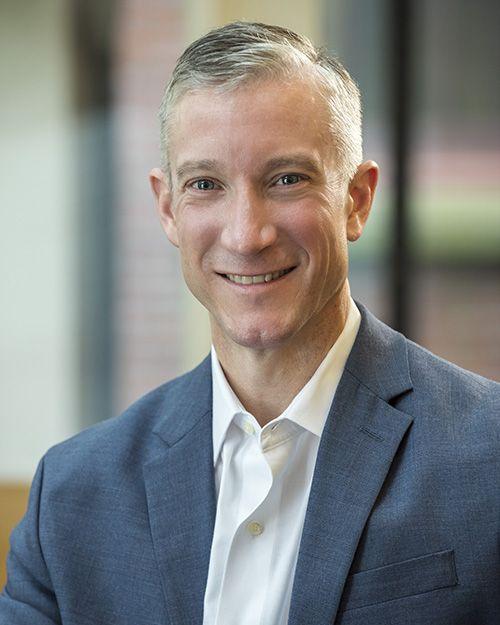Fields of Study
- International Security Studies
- Political Systems and Theories
Country
United States
After two decades in the U.S. Army, serving multiple deployments to the Middle East, Colonel Jeremy Gwinn, F21, wanted a way to translate his on-the-ground skills into contributions to national security policy. That’s what led him to The Fletcher School for his doctoral degree. Now, as he prepares to return to Iraq after graduation, Gwinn reflects on what he’s learned from his professors and peers at Fletcher— including how an obstacle course brought him closer to his classmates.
How did you become interested in international relations?
I’ve been in the Army for about 20 years, with operational and tactical experience and combat deployment in Afghanistan and Iraq. For the next step in my career, I wanted to be able to work at the strategic and policy levels of national security. Getting a Ph.D. in international relations at Fletcher as a Goodpaster Scholar, supported by an Army fellowship, was really the perfect thing to do at the perfect time in my career.
After I graduate, I’m going to Iraq for a year. I’ll be at the Office of Security Cooperation, a combined State Department and Department of Defense organization working out of the U.S. embassy. I’ll be in charge of a team that works with the Iraqi army and counterterrorism service, advising and assisting them to build their security capacity. Eventually, I hope to work on national security policy in D.C.
Why did you choose Fletcher?
Fletcher has a fantastic reputation in the national security community—it’s one of the best policy programs around. In addition, the diverse student body. We have international students, students with NGO experience, diplomatic experience, business backgrounds, and more. Each semester, the military veterans club and the Returned Peace Corps Volunteers host the War and Peace Happy Hour, bringing people with different worldviews together— it’s really valuable.
What was the focus of your dissertation?
I’m examining the factors that contribute to success or failure in cases, post-9/11, when the U.S. pursued security objectives through non-state armed groups, such as the Syrian Democratic Forces. We work through them, advising and assisting them in the counter-ISIS campaign in Syria, with very little U.S. boots on the ground. My research seeks to determine what contributes to success or failure in those cases, because it’s been a mixed record.
My military and combat experience has all been in this irregular warfare context. Serving in Afghanistan, I worked with some of these groups, so it’s always been something that interested me.
What’s a highlight of your time at Fletcher?
One of the most fun things I did was serve as captain of the Spartan Race team. It’s an international series of obstacle course events, with ropes and walls to climb, and there’s one every fall at Fenway Park. After I took over as captain, we also competed in a longer, 12-mile race in New Jersey that involved more than 30 obstacles. It was a really good bonding experience and opportunity to get to know students outside of my small Ph.D. cohort.
A quintessential moment
The annual War and Peace Happy Hour is a quintessential Fletcher moment. As a school of international affairs, The Fletcher School naturally draws a sizable number of veterans and active-duty military officers, such as myself. It also draws a great many students from humanitarian organizations, such as the Peace Corps. In order to help bring together these two diverse groups with, in some cases, vastly divergent world views, the War and Peace Happy Hour has become an unofficial institution where former and current military members and veterans of the Peace Corps come together at a local establishment to socialize and exchange ideas and experiences. While many of us will return to our respective communities following graduation, we will all be better-off having been part of the Fletcher community where exchanges such as this, both in and out of the classroom, are a regular occurrence.
On language exams and the Fletcher network
During the summer prior to my arrival at Fletcher, I'll admit that I was slightly nervous about passing the written and oral language exams. Every Fletcher graduate, regardless of degree program, must demonstrate language proficiency.* This requirement is part of what made Fletcher attractive to me, but it did not make me any more confident in my Afghan Farsi ability. As orientation drew nearer, I knew that I needed to find a native speaker with whom to practice. I had no idea where I would find someone until my very first day of class, when I met another first-year classmate who is a native-born Afghan and spent most of her life in the country! We began meeting regularly in the cafe to converse in Farsi, and thanks to her help, I am happy to say that I passed my written exam on the first attempt. I will take the oral exam in a few weeks and I am now confident that I will pass it as well. Prior to arriving at Fletcher, I knew that the school had an international perspective, but this experience brought it home to me in a very personal way and in a manner, I don't believe I would have encountered anywhere else.
*As of June 2020, most Fletcher degree programs no longer require foreign language proficiency for graduation.
Activities involved in at Fletcher
- Fletcher Veterans
- Fletcher Students in Security
- Admissions Interview Team
- Fletcher SPARTAN Race Team
Education before Fletcher
- Bachelor of Arts, History, Pennsylvania State University
- Master of Business Administration, Finance, University of North Carolina
Experience before Fletcher
- Infantry Battalion Commander, U.S. Army 10th Mountain Division, Fort Drum, NY
- Strategic Planner, Office of the Undersecretary of the Army, The Pentagon, Washington, DC
- Brigade Operations Officer, U.S. Army 101st Airborne Division, Fort Campbell, KY







